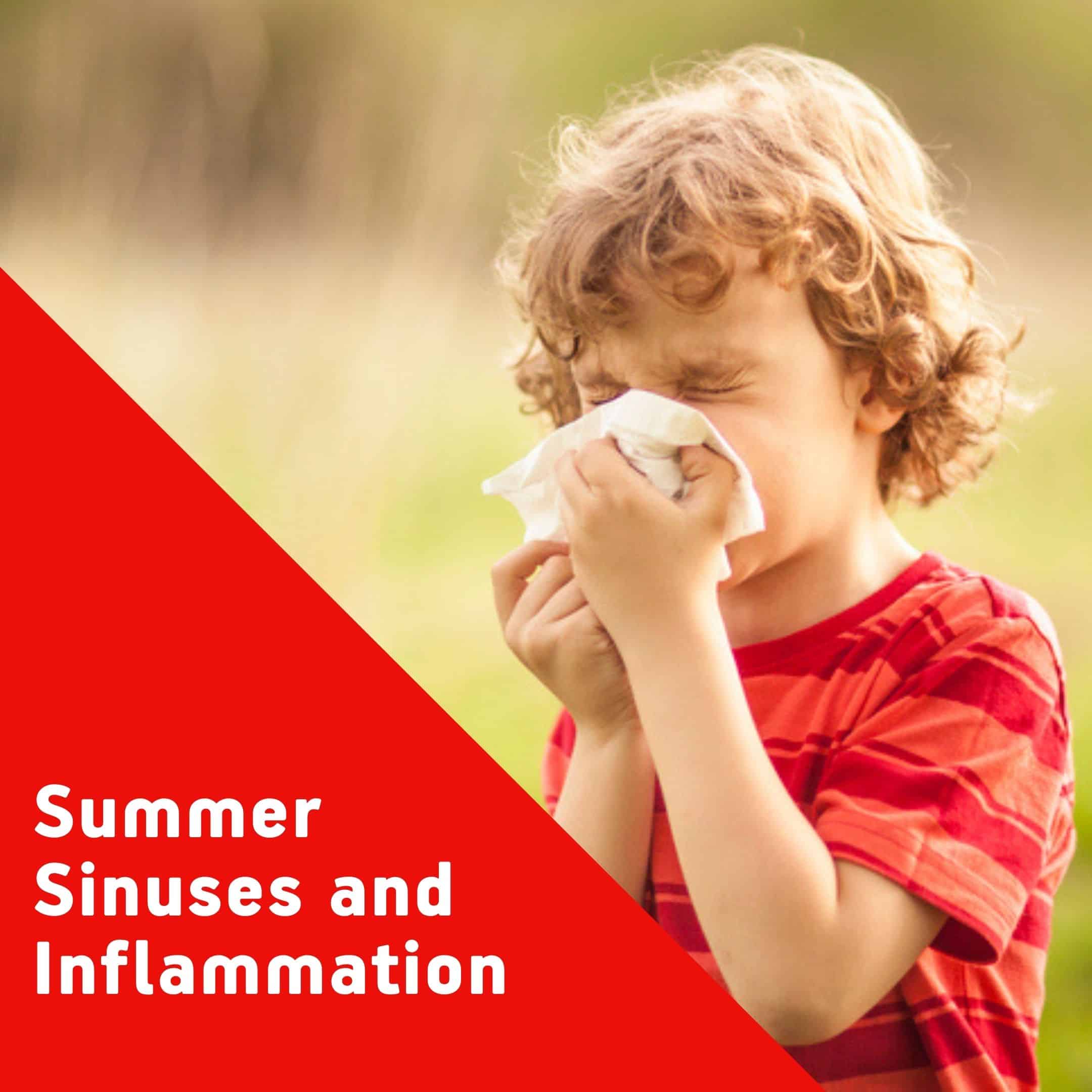We’ve all experienced occasional bad breath after a cup of coffee or a garlicky meal.…

The Cause of Your Summer Sinus Issues: Inflammation
Why Do I Have Problems With My Sinus In The Summer? The Cause: Inflammation – ExcelENT Alabama
Days spent at the pool, nights around the bonfire, hours spent playing outside in the grass. While these are all wonderful things about summer, they can also present challenges for individuals dealing with sinus health. Factors such as allergies, humidity, and air travel can cause inflammation of your sinuses, which then may lead to sinus problems.
At ExcelENT, we have many strategies to recommend and treatment options available that can provide significant relief.
More About Sinuses, Nasal Congestion & Summer
Sinusitis occurs when the spaces inside your nose and head (sinuses) become swollen and inflamed. When this inflammation continues for three months or longer, despite treatment, it’s known as chronic sinusitis.
This common condition interferes with the way mucus normally drains, and makes your nose stuffy. Breathing through your nose may be difficult, and the area around your eyes might feel swollen or tender.
Many things can cause inflammation that leads to sinus issues in the summer, such as:
- Respiratory tract infections — Most people associate these types of infections with colder weather, but they can also occur in the summer. These infections, most commonly colds, can inflame and thicken your sinus membranes and block mucus drainage. They can be viral, bacterial, or fungal.
- Nasal polyps — These are painless, benign growths inside the nasal passages. Prolonged inflammation and swelling of the sinuses from infection and allergies may increase your likelihood of developing polyps.
- Allergies — Inflammation that occurs with allergies can also block your sinuses. Many weeds and grasses bloom in the summer, releasing high amounts of pollen.
- Temperature changes — On hot days, when the air is dry, the mucus in your nose may become thick and sticky, which blocks the sinuses and can cause stuffiness and/or headaches. Changes in barometric pressure, like when a summer thunderstorm pops up in the afternoon, can trigger sinus pain and headaches as well.
- Swimming — The big issue with swimming is the possibility of swimmer’s ear, which is when an infection occurs due to water staying in the ear canal for too long. This creates a perfect breeding ground for bacteria and is most common in children. Water in the nose can also cause inflammation of the sinuses.
It’s not always possible, but oftentimes the best and most effective way to deal with these summer issues that can cause sinus inflammation is to avoid the allergens or triggers. This might be accomplished through lifestyle changes and at-home strategies, such as:
- Using a cool-mist humidifier
- Nasal rinsing several times per day
- Wearing a pollen mask when mowing the grass or cleaning the house
- Keeping windows closed when pollen counts are high
- Using HEPA filters in your vacuum
- Changing heating and air conditioning filters often
- Avoiding nasal irritants, such as smoke, perfume, aerosol sprays, smoke, smog, and car exhaust
- Using a nose clip or ear plugs while swimming
- Washing bedding often; ideally weekly in hot water
With these strategies, summer sinus issues may be avoided or improved, but sometimes sinus infections do occur, and they certainly can happen in the summer. However, there is a difference between a once in a while sinus infection and constant sinus problems that last for months.
Understanding Sinus Inflammation
Sinus inflammation, or sinusitis, is a condition that affects millions of people worldwide. It occurs when the sinuses, which are air-filled cavities in the skull, become inflamed or infected. This inflammation can lead to a range of uncomfortable symptoms, including nasal congestion, facial pain, and fever. When the sinuses are inflamed, it can be challenging for mucus to drain properly, leading to congestion and pressure. Understanding the basics of sinus inflammation can help you recognize the symptoms early and seek appropriate treatment.
Symptoms of Sinus Inflammation
The symptoms of sinus inflammation can vary in intensity, but they often include:
- Nasal congestion or stuffiness: Difficulty breathing through the nose due to blocked nasal passages.
- Yellow or green nasal discharge: Thick mucus that may indicate an infection.
- Facial pain or pressure: Discomfort, particularly in the cheeks and forehead.
- Headaches or migraines: Pain that can range from mild to severe.
- Fever: Elevated body temperature indicating an infection.
- Loss of smell or taste: Reduced ability to detect odors or flavors.
- Fatigue or lethargy: Feeling unusually tired or low on energy.
- Coughing or sneezing: Irritation in the throat or nasal passages.
Recognizing these symptoms can help you determine if you might be dealing with sinus inflammation and whether you need to take further action.
Preventing Sinus Inflammation
While sinus inflammation can be triggered by various factors, including allergies, colds, and infections, there are several strategies you can adopt to help prevent it:
- Stay hydrated: Drinking plenty of water helps keep your mucus thin and easier to expel.
- Use a humidifier: Adding moisture to the air can prevent your nasal passages from drying out.
- Avoid allergens and triggers: Identify and steer clear of common triggers like pollen, dust, and smoke.
- Practice good hygiene: Regular hand washing can reduce the risk of infections.
- Get plenty of rest: Adequate sleep and stress management support a healthy immune system.
- Use saline nasal sprays: These can keep your nasal passages moist and help flush out irritants.
Incorporating these strategies into your daily routine can significantly reduce the likelihood of developing sinus inflammation.
When to Seek Medical Attention
If you experience symptoms of sinus inflammation that persist or worsen, it’s crucial to consult a doctor. Seek medical attention if you have:
- Severe facial pain or pressure: Intense discomfort that doesn’t improve.
- High fever: A significant rise in body temperature.
- Thick, yellow or green nasal discharge: Persistent and unusual mucus.
- Difficulty breathing or shortness of breath: Trouble getting enough air.
- Swelling or redness around the eyes: Signs of a more serious infection.
- A weakened immune system: Increased vulnerability to infections.
A healthcare professional can diagnose sinus inflammation through a physical examination, medical history, and diagnostic tests like X-rays or CT scans. Depending on the cause, treatment options may include antibiotics, nasal decongestants, or steroid nasal sprays. Don’t leave your symptoms unchecked; consult a doctor to find the best course of action for your health.
Strategies and Treatments for Summer Sinus Issues
If you have been fighting off sinus infections for more than three months, it is time to seek medical attention to regain your quality of life. We are very happy that we have many options for treatment at ExcelENT!
For individuals with severe allergies that lead to sinus inflammation, allergy shots are recommended. These shots contain small amounts of allergens and are advised to help desensitize the immune system and reduce allergic responses over time.
Which treatment option may be right for you will vary greatly depending on your specific situation, including what is causing your sinus problems. Dr. Davis is an expert in diagnosing these problems and coming up with the best treatment options.
These include treatments such as RhinAer, SINUVA, and our new biologic option Dupixent to balloon sinuplasty and functional endoscopic sinus surgery, we are thankful to have so many options these days that can help us truly provide relief for our patients.
Discover how the team at ExcelENT of Alabama can help manage summer sinus issues, and chronic sinus problems all year round.
If you are experiencing sinus issues this summer, don’t put off making an appointment with Dr. Davis. Especially while kids are out of school, it’s a great time to address these problems and find the best treatment plan. Schedule an appointment online, or call to discuss coming in at a time that’s best for you: 205-988-6858.


